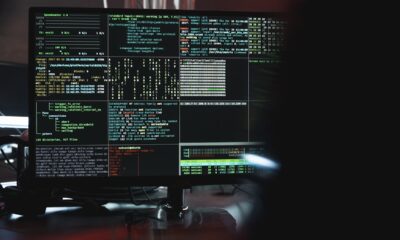Crypto
The Jewel of the Crypto Winter: Digital Tokens Backed by Viable Products
The crypto winter that’s taken over the market in the last few months has been brutal. Besides tanking prices, there has also been the stunning realization that algorithmic stablecoins weren’t really all that stable after all. But that’s not to say that tokens backed by something useful are off the table. Here we look at what new opportunities are emerging, particularly in cybersecurity.

The crypto market has not been in the best shape for the past few months as it plunged into a dark crypto winter. As a result, several crypto platforms have restricted users’ ability to withdraw their deposits. The restrictions have been attributed to falling cryptocurrency prices and extreme market conditions. Another discovery was that stablecoins aren’t that stable after all.
The Cyber Security Industry Comes to the Rescue
Nevertheless, one should not forget that every crisis also offers an opportunity. This opportunity is best proven by the security companies, who quickly devised relevant and working solutions.
The crypto winter and lack of trust in algorithmic stablecoins have created a new breed of cybersecurity tokens. These are stablecoins backed by useful products: namely the security audit of new blockchain protocols and smart contracts.
Introducing the ETD and TURN Tokens
In April 2022, just weeks before the Terra Crisis and the UST stablecoin crash, Europe-based cybersecurity provider Hacken introduced the ETD token, marking the first instance of tokenization in auditing. They created a stablecoin backed by tangible service rather than an algorithm or fiat currency.
The market conditions of the next few months have confirmed the merits of this idea. Other providers in the industry are joining the bandwagon.
In particular, ConsenSys Diligence recently introduced TURN tokens, which perform the same task as ETDs in the form of NFTs. So now Hacken and Consensys, the two most prominent crypto audit players, are offering digital tokens that developers of new blockchain projects can use to have their platforms audited. For them, it has the advantage that the check has been carried out more quickly, but overall it is intended to contribute to transparency in the market.
How the Tokens Work
Both tokens provide the priority queue for security reviews by the respective company. ETD is available in a limited number of 1000 tokens, while the number of TURN is unknown. An ETD token has a fixed value of 5,000 USDT, with the stablecoin USDT (Tether) being tightly pegged to the value of US dollars. In the meantime, ConsenSys Diligence is offering 8 time-limited auctions for TURN NFTs at a starting price of 100,000 DAI (equivalent to $100,000).
Each ETD corresponds to one day’s work by Hacken’s smart contract review team, including Senior Auditor, Middle Auditor, Security QA Lead, and Reporting Expert. In contrast, TURN stands for 40 hours of exam time with a deadline by which the tokens must be redeemed.
Immutable Value
By setting a constant and finite time, ETD’s value remains the same regardless of market conditions, making it an ideal stablecoin. In contrast, the ConsenSys Diligence auction model does not put a cap on the price of TURN, instead leaving the decision to market forces.
ETD’s fixed cost at the lower end of the price spectrum makes it more accessible to the community. There is also a 10% discount for the first 250 EDTs. ETD offers higher stability, while TURN could be more beneficial for players hoping to sell it on the secondary market at a higher price than any other cryptocurrency.
Ultimately, there is no “one size fits all,” as each token’s usefulness depends on the project’s size and the audit’s scope. Either way, tradable utility stablecoins are a solid investment choice as they provide a hedge against the rising costs of the underlying services.
__
(Featured image by Michael Dziedzic via Unsplash)
DISCLAIMER: This article was written by a third party contributor and does not reflect the opinion of Born2Invest, its management, staff or its associates. Please review our disclaimer for more information.
This article may include forward-looking statements. These forward-looking statements generally are identified by the words “believe,” “project,” “estimate,” “become,” “plan,” “will,” and similar expressions. These forward-looking statements involve known and unknown risks as well as uncertainties, including those discussed in the following cautionary statements and elsewhere in this article and on this site. Although the Company may believe that its expectations are based on reasonable assumptions, the actual results that the Company may achieve may differ materially from any forward-looking statements, which reflect the opinions of the management of the Company only as of the date hereof. Additionally, please make sure to read these important disclosures.
First published in Crypto Monday, a third-party contributor translated and adapted the article from the original. In case of discrepancy, the original will prevail.
Although we made reasonable efforts to provide accurate translations, some parts may be incorrect. Born2Invest assumes no responsibility for errors, omissions or ambiguities in the translations provided on this website. Any person or entity relying on translated content does so at their own risk. Born2Invest is not responsible for losses caused by such reliance on the accuracy or reliability of translated information. If you wish to report an error or inaccuracy in the translation, we encourage you to contact us.

-

 Crypto3 days ago
Crypto3 days agoXRP vs. Litecoin: The Race for the Next Crypto ETF Heats Up
-

 Biotech2 weeks ago
Biotech2 weeks agoVytrus Biotech Marks Historic 2024 with Sustainability Milestones and 35% Revenue Growth
-

 Biotech11 hours ago
Biotech11 hours agoSpain Invests €126.9M in Groundbreaking EU Health Innovation Project Med4Cure
-

 Crypto1 week ago
Crypto1 week agoRipple Launches EVM Sidechain to Boost XRP in DeFi
























